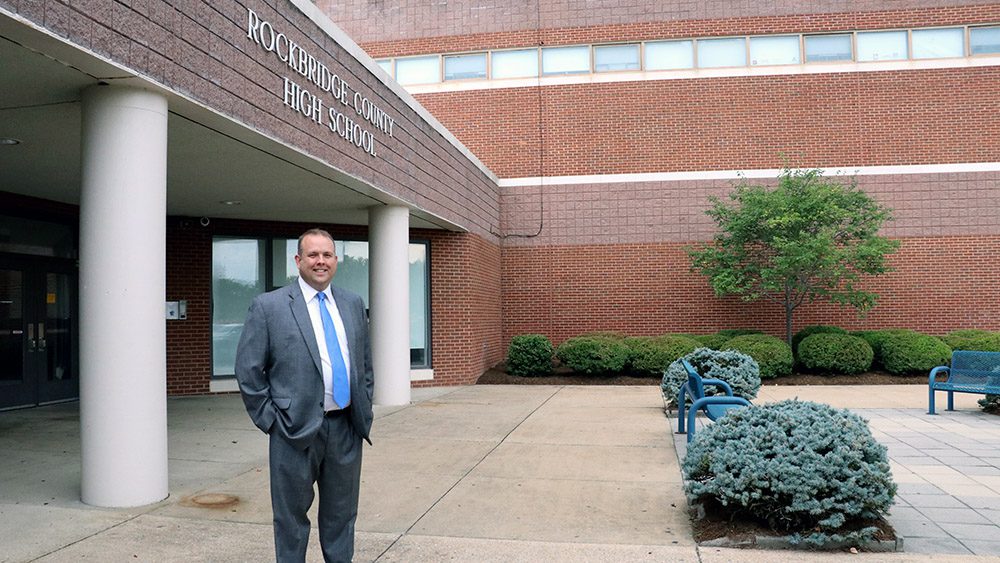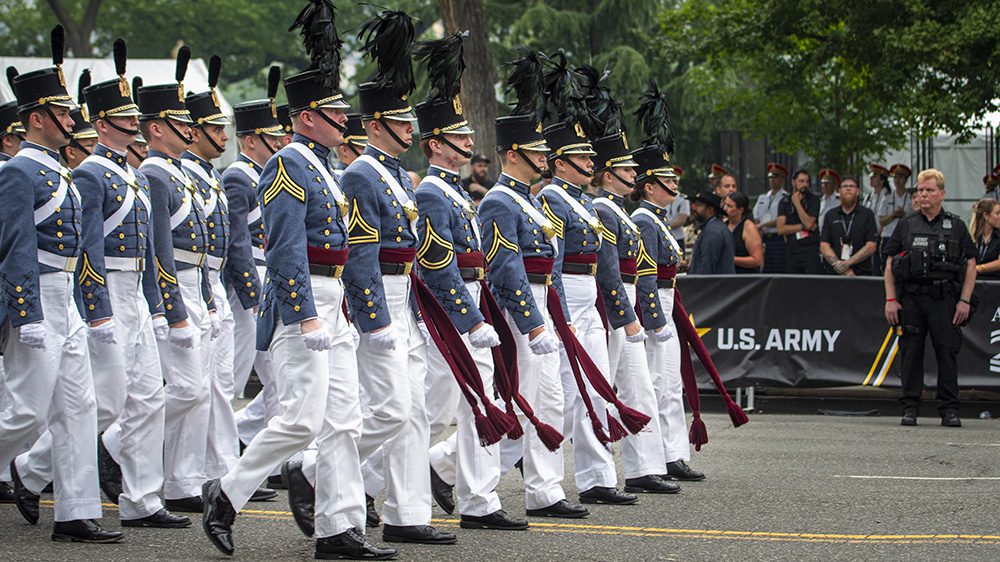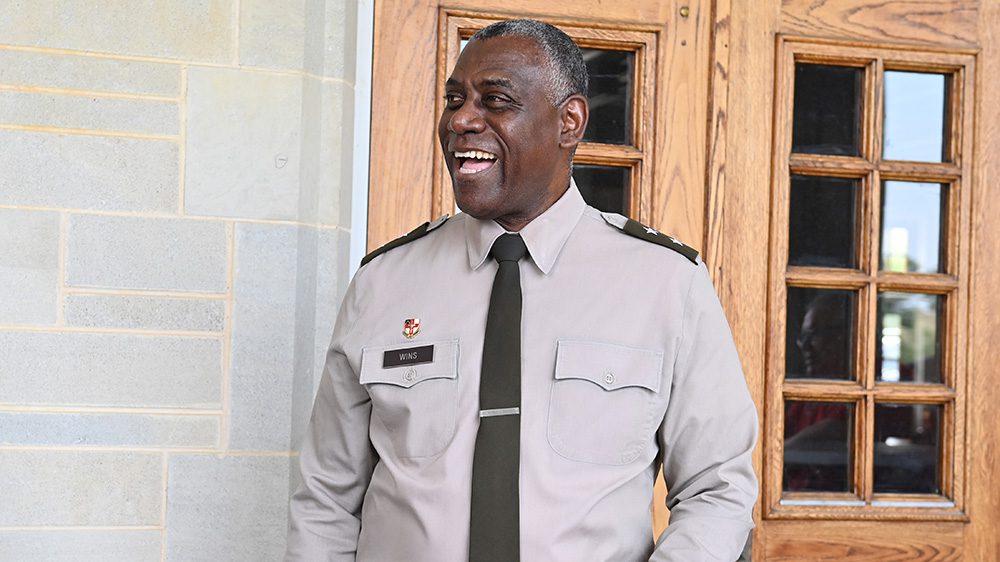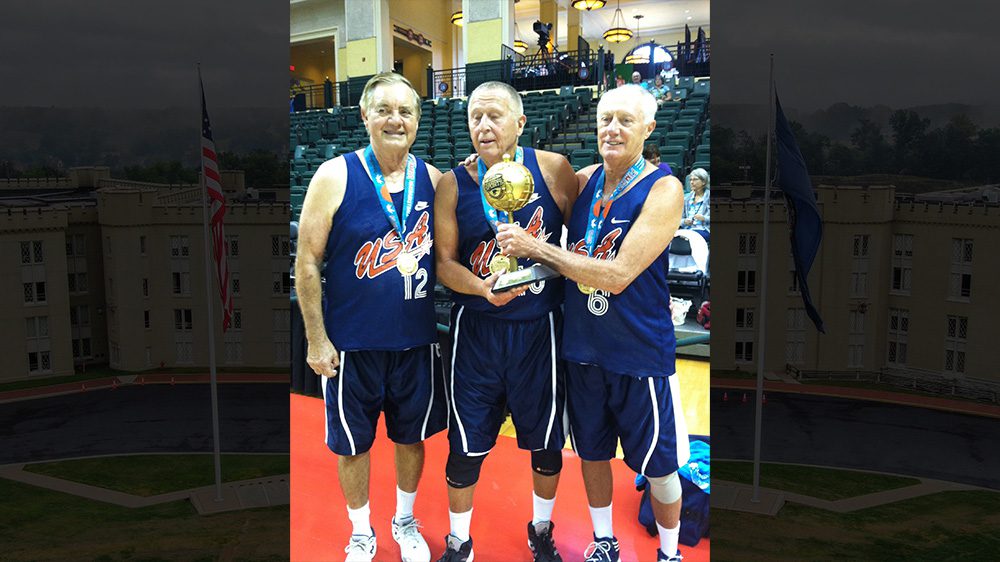Teaching has long been important to Jason Breeding ’02. His interest in science was nurtured by his teachers in Russell County, Virginia, and he credits his decision to study chemistry as an undergraduate in part to “a great chemistry teacher in high school.”
It was the promise of strong teaching that drew him to VMI. As he recalled what he experienced during his open house visits, “It was very obvious that the faculty were committed to helping the cadets and that appealed to me.” So appealing was this that he applied to VMI for early decision.
An Institute Scholar all four years as a cadet, Breeding’s initial impression of the quality of VMI’s faculty was borne out during his cadetship. “The faculty in the Chemistry Department was very welcoming, and my relationships with them developed throughout my time at VMI, to include the summers when I was on post doing research. In fact, I still keep in contact with my professors.”
After graduation, Breeding headed to the University of North Carolina-Chapel Hill to pursue a Ph.D. in Chemistry. But again, teaching – this time, his experience with it – had an influence on his plans for the future. “I found more enjoyment in teaching and tutoring than I did in research.” Breeding took some educational classes at UNC-Chapel Hill and toyed with the idea of entering the school’s Ed.D. program, but at that time, it seemed to be more designed for those with experience in teaching and administration. So in 2004, he took his master’s degree, returned to his native Southwest Virginia, and became a high school teacher.
For the next nine years, he taught mathematics and chemistry in Washington County. He taught both regular- and honors-level courses and in inclusion-based classrooms, which contained students who needed individualized instruction in mathematics due to a learning disability. He also served as a teaching adjunct at Virginia Highlands Community College and Emory & Henry College.
Asked why he chose to teach at a public school, he harkened back to his personal experience. “I enjoyed school, but I knew the issues many students had when they came to college. So, I really felt that I could be of service teaching high school.”
His experience also prepared him to face the teaching profession’s challenges. “There is constant change,” he said. “You also need to find solutions to problems which have variables you cannot influence.”
“It’s also a very intimate job,” he continued, “in that you need to get to know students and their families and build relationships with them – as well as your colleagues. That takes time and a lot of energy, something which most people outside the profession don’t understand. In K-12 education, there is a lot of emphasis on the teacher being responsible for student success and that creates a sense of pressure. Some of that is healthy, but too much pressure can create anxiety. Happily, finding that balance and pushing my limits has appealed to me and that helped me grow as a teacher.”
He also credits some of his success to the people he encountered on post. “People such as Steve Reithmiller ’63, Tappey Jones ’70, Francis Bush, Alan Baragona, Henry Schreiber, Kurt Iversen ’85, Judith Cain, George Piegari, Troy Siemers, Vern Beitzel ’72, Tom Mortenson and Adam Volant ’88 helped inculcate in me some of the ideals and attributes that I have applied as an educator and an active member of society.”
A couple of years into his time at Abingdon High School, Breeding began to consider moving into educational administration. He was prompted to do so by his colleagues. “I had participated on several state-level curriculum committees, and I had advocated for school employees as a leader in the local education association. That led many to encourage me to look into administration.”
A grant program allowed him to be certified in Administration and Supervision by the University of Virginia at a greatly reduced cost, although it demanded a lot of time—two years, which included many weekends and two summers. While he completed the program in 2009, he taught for another four years before exploring opportunities as an administrator. In 2013, he became an assistant principal with Roanoke City School system; first at Patrick Henry High School from 2013-18 and then at Lucy Addison Middle School from 2018-19.
In spring 2019, Breeding was appointed principal of Roanoke County’s Northside High School. He had already anticipated challenges in the new job. “Transitioning to a head principal position from another district presents a steep learning curve in and of itself,” he said. “The pandemic made that curve even steeper.”
Initially, Breeding was hopeful that the two-week hiatus for schools would be sufficient to address the public health concerns and the school year would resume without much disruption. Things worked out differently, of course, and that meant some rapid changes to accommodate the extended closure.
“My administrative team’s job shifted to providing direction and support to teachers, checking in with families much more frequently, providing meal delivery and determining how to best recognize our seniors who had so much stripped away from them,” Breeding said. Asked to describe the experience, he replied, “Humbling is the best word.”
While humbling, the experience provided Breeding with what he described as opportunities for clarity and reflection. “I spent a lot of time and energy and made many sacrifices to get to the position I had. I achieved my goal, but in chasing that goal, it had become my identity. When I came to that realization, I knew I needed to make a change.”
Breeding still wanted to remain in K-12 education. So, he had to choose between a different administrative position or returning to the classroom. Complicating the choice was the uncertainties prompted by the pandemic. In the end, he chose the latter. And that choice brought him back to Lexington, specifically as a mathematics teacher at Rockbridge County High School.
As to where this decision will take him, Breeding first addressed the professional aspect. “It’s important for leaders to ‘see through the crew’s eyes.’ This opportunity will give me better insight into what’s is needed now to be successful in the classroom. As I hope to return to administration in the future, that will help me immensely. I also plan to use this time to finish my dissertation and so achieve the goal of receiving my doctorate.”
“On a personal level, it’s great being back in my second home and being an active member of the community. I will be getting married in October 2020, too. So, all in all, I’m extremely happy with where my life is heading.”
When asked what would improve what he calls “the profession of education,” Breeding unhesitatingly answered, “Get more VMI alumni involved in it – and across the board, as K-12 teachers, college professors, school board members, and members of city councils or boards of supervisors. Education is supposed to be the great equalizer in America; however, the pandemic has taught us that many inequities remain in education, whether that be in K-12 or post-secondary. There’s a lot of work to do, and the citizen-soldiers that VMI graduates are the type of people who can get it done.”
-

Scott Belliveau '83 Communications Officer - Executive Projects
The communications officer supports the strategy for all communications, including web content, public relations messages and collateral pieces in order to articulate and promote the mission of the VMI Alumni Agencies and promote philanthropy among varied constituencies.




